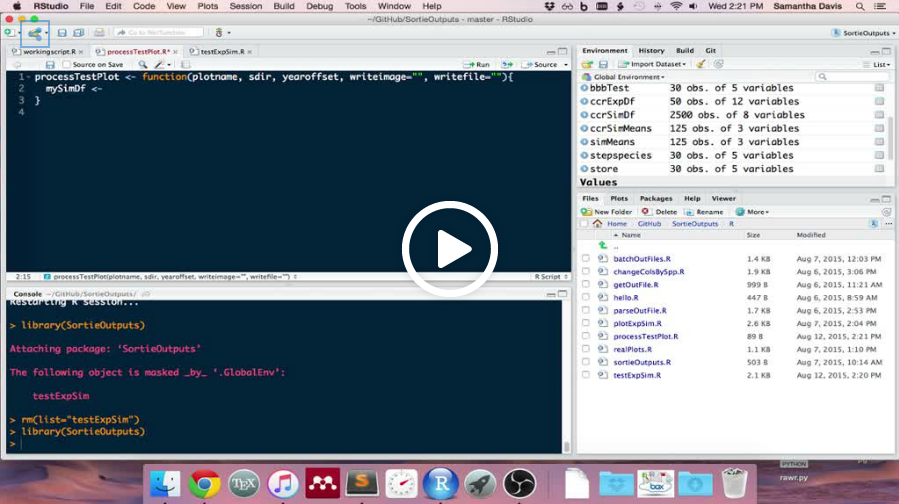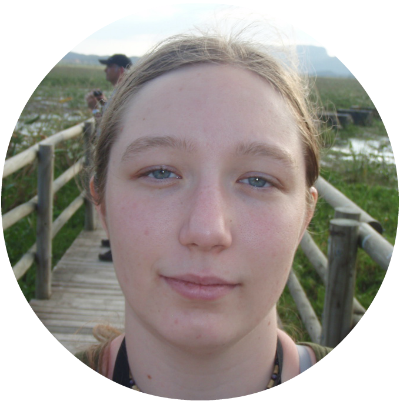Who’s Bugdoctor? What is the main goal of her research? How is she using R and Python in her research? Let’s find out:
Real name: Sam
Alter ego: Bugdoctor
Location: Merced, CA. USA
Powers/abilities: R, C/C++, Python, PHP
Username: https://www.livecoding.tv/bugdoctor/
Questions:
Q: What do you do in normal life?
A: My job is currently research, which means I get to use R from day to day, alongside other computer programs. I might be an ecologist at heart, but in action, I’m currently a programmer. Research is funny that way — you wear a lot of different hats trying to get the answers. Outside of work, I play a lot of Destiny, watch a lot of soccer and football, and try to live a happy, healthy life. We go camping at least once a year, and I love the outdoors when I don’t live in a desert.
Q: What is the main goal of your academic research? What question are you trying to answer for humanity?
A: Right now, I’m working on the big question, “What will happen to our California forests in the next 100 years?” Unfortunately, we’ve been using and abusing the earth so much that it’s gone out of whack. So things like drought, climate change, fire — all of these things are going to change how our forests are composed (the species, sizes, and numbers of trees), as well as how they function. This question, when answered, will help forest managers and even the Christmas tree industry guide their decisions on how to manage their tree stands.
Q: How does your academic research challenge you to use R and Python for data analytics?
A: I’m trying to build a model of what’s going to happen, and I’m using real data to do it. To be honest, I’m learning Python because a lot of other people in science use it, and apparently it’s a great alternative to R in some cases. For the research, I’m using mostly R to deal with I/O into SORTIE-ND, which is a forest modeling program written in C++. I have not yet tackled C++ yet, but I’ll need to, because I want to program some extensions to SORTIE-ND to account for genetics and alternative “sub-models” for things like growth and death.
Q: When did you first learn to code? How did it go initially?
A: I first learned to code when I was 12 years old, so it’s been just over half of my life. I had learned HTML a little earlier than that. Those were the homestead.com days, and I was pretty great at building 90s websites. The sticky, starry background when you scrolled was my jam. Anyway, I started learning real code, PHP and MySQL, because I wanted to build a member site for people to talk about different religions. This was before wordpress and phpBB was still in its infancy and didn’t really do the CMS stuff I wanted, so I learned basic PHP/MySQL. I ended up using that knowledge to create my own work study job in college, but I’ve never had any formal training in coding. I obviously succeeded, though I’m sure I picked up some bad habits along the way. I do remember being frustrated when I first started and having nowhere to turn for help. Also, having my mind blown with OOP.
Q: If you were a programming language, which one would you be? And why?
A: I barely know PHP anymore, but PHP is still where my heart is. It just feels like home to me. PHP is the cheap master of all trades. It’s free to install and run, it’s been around for a long time, it can incorporate so many other languages and do so many things, but it still manages to be on top of its game. Twenty years later or so, and it still is the powerhorse for major websites? That’s pretty badass.
Q: What is the primary motivation for streaming your coding sessions?
A: My own entertainment. If it wasn’t fun, I wouldn’t keep coming back. But it’s addicting, especially when people are laughing at me and enjoying my misery as I learn Python. I also like streaming R because not a lot of “real programmers” use it because it is a statistical language. I’ve always enjoyed helping others learn about science, and if I get to do that through code, and while I’m working at my “real job”, that’s even better.
Q: Where did you discover Livecoding.tv?
A: It was actually a joke google search. My husband is trying to break into Twitch, and I was like, “Gee, I wonder what else can get live streamed” and I typed in “coding streaming” or something like that, because that’s what I do, and Livecoding.tv popped right up!
Q: If you were not working in academic research what job would you be doing?
A: I think I’d end up in the education, non-profit, or data science industry. I know those are really broad categories, but I’ve got diverse interests and if I can make a difference, I’ll be happy. As it is, I may end up leaving academia, because I have no interest in running my own academic lab, and money is tight. Unfortunately, public funding for science has remained essentially the same each year for the last 10 years, and most of the money goes to the top 10 labs in the country, and the rest of the money is just scraps for the other hundreds of labs to fight for. Many people in academia rely on soft money — grants that may dry up in a few years. I don’t want to be responsible for finding money to keep my staff employed for the rest of my life. I’d much rather find an organization with permanent money, or do something meaningful in a science-affiliated career.
Check out one ofBugdoctor’s recent streams: R Package: SortieOutputs









